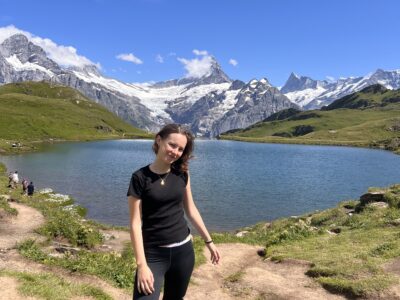
Energy Strong: Motivating Responsible Energy Use at USMA
The goal of this project was to encourage cadets to conserve energy at the United States Military Academy at West Point (USMA). To that end, the team recommended a multifaceted program that included: an energy-saving competition between USMA and the U.S. Naval Academy; a mock billing system at West Point, which would also make real-time energy-consumption data available to the cadets; and the creation of sustainability office to foster a culture of accountability. The proposed energy reduction competition between the military academies would tap into the competitive nature of the United States Armed Forces, and the rivalry between Army and Navy. Ultimately, these efforts will help to effect lasting sustainability operational changes at USMA and may even influence energy policy within the U.S. Army as an institution.
Team members: Kevin Cho, Mikhael Cohen, Natalie Paret, Samantha Peltz, Vanda Polokova, and Sammy Roth
McEnroe Organic Farm: Options and Opportunities for Compost and Live-Roof Media Expansion in NYC
The main objective for this project was to investigate how McEnroe Farm might expand two of their business ventures— a well-established compost business and a new live-roof media production— into New York City. Green infrastructure has become a priority for both public and private organizations, and the city has begun to take into account the impact that urban activities have on the environment. Therefore the goal of this project was to identify ways for McEnroe Farm to connect with the urban market and become a new paradigm in sustainable farming. To achieve this the team conducted an analysis of the existing urban and suburban compost markets, looked at alternative production methods for live-roof media, and conducted a financial analysis, to deliver recommendations that McEnroe can put into action.
Team members: Seung Joon Ha, Hamza Khan, Sara Lavenhar, and Isabel Penaranda
Tomato Tourism: Bringing the McEnroe Experience to Urban Consumers
This second project focused on helping McEnroe Organic Farms to expand its agritourism mission. Agritourism is a niche industry that brings the “farm experience” to rural and urban communities, in order to teach people about agriculture and where their food comes from. The goal of the project was to increase awareness of McEnroe Farm through social-media marketing and relationship development with community centers and gardens. Additionally, the team worked on expanding McEnroe’s educational outreach to NYC schools, in order to benefit both urban-city youth and the business development of the farm.
Team members: Autumn Bordner, Yong Gyeong Choi, Thomas Sanderson, and My Seppo
Clarifying Uncertainty: Assessing a System Dynamics Model in the Nile River Basin
This project, conducted with the United States Military Academy at West Point, assessed the current inputs for precipitation and groundwater recharge rates in the Nile River Basin, as well as the Vensim model’s ability to generate accurate stream flow outputs. The purpose was to provide support for the client’s approach for analyzing water resources in the Nile River Basin. The team’s analysis allowed them to provide recommendations on alternate approaches that would capture more of the complexity of the hydrologic system.
Team members: Robert Fuks, Katie Naum, Onella Cooray, Karen Hime, Nicole Migliore, Rihana Diabo, Dale Padelford, and Yvonne Vogt
Climate Change and Crop Yields: A Water Driven Analysis of Food Production and Social Impact in the Nile River Basin
This project, also conducted with the United States Military Academy at West Point, explored the relationship between water resources and crop production in the Nile River Basin. Thie project aimed to model crop yield based on climate change scenarios, irrigation methods, crop type, among other variables. Students were able to provide insight into how water demand for food production may influence population dynamics and potential conflict in the region over the next century.
Team members: Joe Girton, C. Damienne Harfouche, Peter Kim, Sabrina Korman, Kyle Marsh, Monica Molina, Shamm Petros, Nam Phatraprasit, Atti Worku
To watch the presentation video, please refer to the following link: http://youtu.be/AVAZp4KgME0.
Columbia’s Undergraduate Program in Sustainable Development is an interdisciplinary program that addresses sustainable development through an understanding in the interaction between natural and social systems, offered through the Earth Institute in partnership with Columbia College and the School of General Studies. Participating departments and schools of the Sustainable Development major and special concentration include the Department of Earth and Environmental Biology; the Department of Earth and Environmental Engineering; the School of International and Public Affairs and the Mailman School of Public Health.
To learn more about the Undergraduate Program in Sustainable Development, please visit our website or contact Jessica Sotomayor, Program Manager at jsotomayor@ei.columbia.edu.



